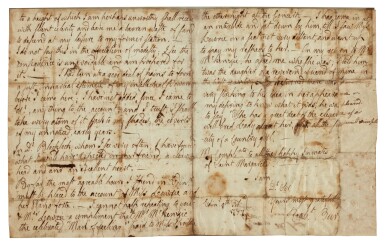Auctions
Buy Now
Collectibles & More
Books & Manuscripts
Books and Manuscripts, Medieval to Modern
Books and Manuscripts, Medieval to Modern

Fine books and manuscripts from a private Scottish library
Lot Closed
December 13, 02:09 PM GMT
Estimate
7,000 - 9,000 GBP
Lot Details
Description
Robert Burns
Autograph letter signed, to the Rev. George Lowrie [Lawrie]
apologising for his slow reply to Lawrie's letter ("...I will not trouble you with any account, by way of apology, of my hurried life & distracted attention: do me the justice to beleive [sic] that my delay by no means proceeded from want of respect..."), assuring him that he has not been distracted by his sudden celebrity in Edinburgh, which he knows will soon fade, and with news of Lawrie's daughter Christina ("...By far the most agreeable hours I spend in Edinr must be placed to the account of Miss Lawrie and her Piano forte..."), 3 pages, 4to, with integral autograph address panel, Edinburgh, 5 February 1787, loss of about 8 words of text (supplied in manuscript) and portion of signature, strengthened at folds, stained
"...I have no great temptation to be intoxicated with the cup of Prosperity. - Novelty may attract the attention of mankind a while; to it I owe my present eclat: but I see the time not distant far when the popular tide which had borne me to a height of which I am perhaps unworthy shall recede with silent celerity and leave me a barren waste of sand, to descend at my leisure to my former station..."
AN IMPORTANT AND REFLECTIVE LETTER AT THE TIME OF BURNS'S EARLY POETIC SUCCESS, WRITTEN TO A MAN WHO HAD PLAYED A KEY ROLE IN INTRODUCING HIS POETRY TO EDINBURGH LITERARY SOCIETY. The Rev. George Lawrie (1727-99) was a minister in Loudoun, near Kilmarnock, who had admired the verses published Poems, Chiefly in the Scottish Dialect, (Kilmarnock, 1786) and sent a copy to his friend, the blind Edinburgh poet Rev. Thomas Blacklock. Lawrie then shared with Burns Blacklock's enthusiastic appraisal of the poems. Burns later described how this letter "overthrew all my schemes by rousing my poetic ambition", and Blacklock also ensured that the Kilmarnock poems came to the attention of the Edinburgh literati, which in turn led to a rapturous review in The Lounger in December 1786 praising the work of this "Heaven-taught ploughman". It was this reception which led to Burns's decision to travel to Edinburgh to oversee a second edition of his poems, where he found himself feted by elite society. Burns made the most of his sudden success (he fathered at least one child during these months in Edinburgh), and indeed had only found time to visit Thomas Blacklock after he had been prompted by Lawrie. In this letter Burns assures Lawrie that he is now seeing Blacklock regularly, finding him to be a friend with "a clear head and an excellent heart".
See also lots 108 and 179.
LITERATURE
Letters of Robert Burns, ed. Ferguson, no. 80